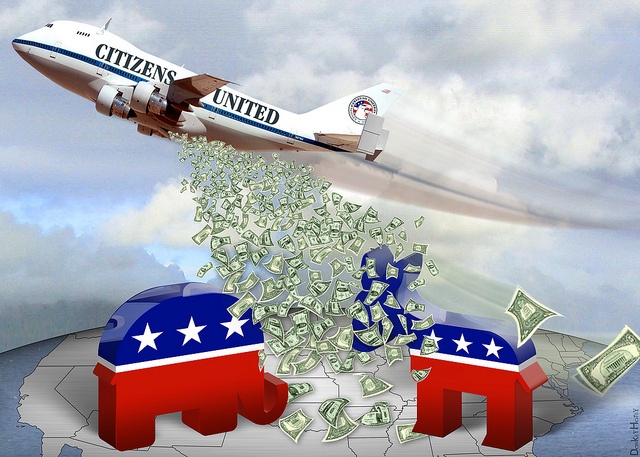Republicans make big advances thanks to Citizens United

(Cartoon by DonkeyHotey via Flickr.)
It's been more than four years since the U.S. Supreme Court handed down its decision in Citizens United v. Federal Election Commission, a ruling that expanded the ability of corporations and unions to influence politics. Now, with two election cycles completed, a series of studies has emerged to assess what impact it's had on our political system.
One of the first and most thorough investigations into Citizens United's effects on elections, published in July by professors at the University of Alberta and Emory University and a researcher at Competition Economics, concludes that the ruling has significantly benefited Republican candidates for state legislatures -- especially in North Carolina and Tennessee.
Before the January 2010 Citizens United decision, corporations and labor unions were prohibited from making so-called independent expenditures for federal races -- spending that expressly supports or opposes a candidate or cause but is not coordinated with election campaigns. At the time, 22 states had bans or restrictions on such spending. The ruling overturned those laws and allowed for the rise of super PACs, groups that can take in unlimited donations from corporations, unions and individuals to fund independent expenditures.
The result in the 2010 and 2012 elections was profound, according to study authors Tilman Klumpp, Hugo M. Mialon and Michael A. Williams. They analyzed more than 38,000 state legislative races, comparing the 22 states that were forced to remove their bans on corporate and union political spending after Citizens United with the other 28 states that had no bans (the control group).
For one, businesses expanded their influence more than labor groups, largely to the benefit of Republicans. Republican-oriented super PACs raised about 50 percent more money during the 2010 and 2012 elections than their Democratic-oriented counterparts, and they spent about twice as much.
Corporate money fueled an overall rise in super PAC donations between 2010 and 2012 as post-Citizens United politics took hold: Total super PAC donations went up tenfold, from about $82 million in 2010 to about $828 million in 2012.
The increase in corporate money in elections has been more likely to help Republicans than Democrats, the study found. Overall Citizens United has resulted in a 4 percent increase in the probability that a Republican candidate is elected in state House races. In North Carolina and Tennessee, the odds for Republicans increased 15 percent.
The authors also concluded that Citizens United changed the dynamics of who runs for legislative offices. Nationally, there was a 10 percent decline in Democratic candidates in state House races where Citizens United spending played a role. Once elected, Republicans were 5 percent more likely to seek reelection, and 6 percent more likely to win.
THE RSLC POLITICAL MACHINE
A key turning point, according to the study, was a corporate-fueled Republican effort in 2010 to win over state legislatures in time for redistricting after the Census. As Facing South was one of the first to document, that year the Washington, D.C.-based Republican State Leadership Committee (RSLC), a super PAC-style group, launched REDMAP, or "Redistricting Majority Project." In the wake of the Citizens United decision, the RSLC was able to accumulate a $30 million war chest targeting state legislative races, fueled by corporate contributions from the banking, communications, energy, insurance and tobacco industries.
In the 2010 mid-term elections, Republicans took hold of 20 more state legislative chambers than they had had before. Only 15 state lawmakers from the GOP lost reelection bids, while 492 Democrats lost theirs. Even accounting for other factors, like the anti-Democratic backlash after President Obama's 2008 election, the report concludes that "Citizens United has increased Republican election probabilities in state House elections," largely because of the boost in corporate election spending.
North Carolina emerges as a case study of post-Citizens United corporate influence. The RSLC has pointed to the state as a success story of the REDMAP initiative. That year, the RSLC funneled $1.25 million into North Carolina elections, all of it going to Real Jobs NC, another super PAC-style group linked to conservative mega-donor Art Pope. Real Jobs targeted 19 state House and Senate races in 2010; in 16 of those, a Republican ousted an incumbent Democrat.
In 2012, the RSLC raised $40 million, even more than it had in 2010. North Carolina was again a key beneficiary of the group's corporate largesse: The D.C. group steered more than $1.4 million to North Carolina, $250,000 of it going to Real Jobs NC and another $1.16 million to Justice for All NC, which spent more than $1 million to benefit conservative N.C. Supreme Court nominee Paul Newby, who won.
This year the RSLC pumped another $900,000 into Justice for All NC, which ran a series of widely condemned attack ads against incumbent N.C. Supreme Court candidate Robin Hudson before the state's May primary elections. According to the Institute's FollowNCMoney.org money-tracking website, many of the RSLC's leading backers are North Carolina companies, including tobacco giants Reynolds American and Lorillard Tobacco, who recently announced a planned merger.
While the study from Klumpp, Mailon and Williams doesn't focus on the influence of independent expenditures on judges, it points to another study that found elected state supreme court judges who received more direct contributions from business interests during partisan election campaigns were more likely to decide cases in favor of those interests.
The authors conclude that their report may underestimate the full impact of Citizens United on national politics. The ability of corporate-funded groups to help fuel GOP victories in 2010 and thus put Republicans in charge of redistricting also affected the makeup of Congress. This was clearly a factor in North Carolina, where the majority of voters picked a Democratic U.S. Representative in 2012, but where thanks to GOP-friendly districts eight members of the state's 13-member delegation are Republicans. The report also notes that Citizens United likely fueled more corporate spending in states where it was legal before the 2010 decision.
Put together, Citizens United's role in increasing corporate spending on elections, and its effect on who gets elected, promises to have a lasting impact on a wide range of issues. As report finds, "In the long run, [the increase in corporate political influence] has the potential to influence a wide range of policies, including healthcare, environmental, immigration, trade, tax, and financial policies."
Tags
Alex Kotch
Alex is an investigative journalist based in Brooklyn, New York, and a reporter for the money-in-politics website Sludge. He was on staff at the Institute for Southern Studies from 2014 to 2016. Additional stories of Alex's have appeared in the International Business Times, The Nation and Vice.com.
